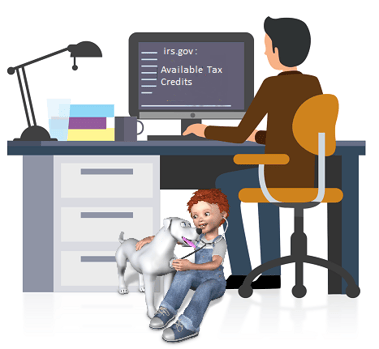With the pandemic of 2020, many of those who are fortunate to still have a job may be working from home. So, you’re probably wondering if you can take a home office deduction. Well, normally if you’re working at home for an employer, you can’t deduct home office expenses. There are basic requirements in place for deducting home office expenses. With so may tax rules changing each year it is important to be aware for the deductions and consideration available to you. So, if you’re currently working from home there are a few things you might consider to qualify for the home office deduction.
The home office deduction basics include 2 requirements:
- The home office is used only for business purposes. Your office space must be dedicated only to operating your business. The area can’t be used for a living room or media room, etc. If audited by the IRS, there should be no doubt the designated area is for business use only.
- Your office is your primary place of business. The space should only be used to conduct meetings or meet with clients, and the only place where your administrative work is completed. When you meet with your clients or do business away from your
 home office, keep a journal with specific details of your business dealings as proof that it doesn’t violate the “primary place of business” rules.
home office, keep a journal with specific details of your business dealings as proof that it doesn’t violate the “primary place of business” rules.
Although almost everyone that works from home will meet both basic requirements, those of you who receive a W-2 from an employer cannot deduct your home office expenses on your income tax return. However, there are 3 options to consider, that may help to resolve this issue so you can qualify to deduct your home office expenses on your income tax return.
- Independent contractor. You can switch from an employee to an independent contractor. This is one of the easiest ways to enable you to deduct your home office expenses. A number of businesses are having employees work from home due to the pandemic. This option may be worth looking into for the home office deductions. However, it’s worth noting that you may lose important benefits if your switch to an independent contractor, such as your health insurance, and you will also have the additional cost of self-employment taxes. It’s important that you do the math before making this important decision.
- Start your own business. Consider starting your own business if working as an independent contractor isn’t an option with your current employer. This will allow you to deduct all your business related expenses, including your home office expenses, on your income tax return. Just be sure that your home office is in a different location in your home than any of your other work areas.
- Take into account your entire household. You may not qualify for a home office deduction, but maybe a family member in your household may qualify.
If these 3 options are unrealistic for you, you may still work something out with the assistance of your employer. After all, you still have the added expense of your utilities, internet, phone, and other expenses. Some businesses have remedied this issue by allowing employees to submit valid expense reports to help cover the extra costs of working from home. Your employer can do this by setting up an accountable plan for you. If you’re already a remote worker, your employer may already offer this option.
Summit CPA Group is a distributed virtual CFO firm with a non-traditional approach to accounting. Our amazing team of CPAs and accountants provide professional Virtual CFO Services and 401(k) Audits for companies all over the United States—many of which are remote companies as well. The Summit team fully understands the accounting, bookkeeping, cash flow management, and business tax nuances that come with being distributed, and they love helping clients overcome these challenges through their own experience and expertise. Contact our office at 866-497-9761 to schedule an appointment with our advisors.
.png?width=120&height=77&name=Summit-Virtual-CFO_color_rgb%20(1).png)















